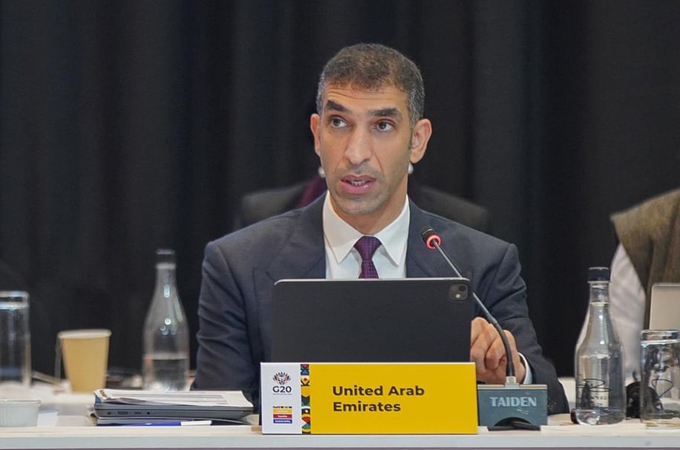 Dr Thani bin Ahmed Al Zeyoudi
Dr Thani bin Ahmed Al Zeyoudi
UAE believes that open rules-based trade remains an essential driver of long-term development for nations across the world, Foreign Trade Minister Dr Thani bin Ahmed Al Zeyoudi said during the G20 Trade and Investment Ministerial Meeting (TIMM) in Gqeberha, South Africa.
Al Zeyoudi used the platform to highlight the UAE’s ongoing advocacy for collaborative solutions to today’s trade issues, including the need to strengthen and modernise supply chains and enhance the accessibility and equity of the global trading system, said a Wam news agency report.
The G20 Trade and Investment Ministerial Meeting is the principal forum for member nations to discuss issues relating to trade and investment, which will then inform the discussions at the G20 Leaders’ Summit in November. The UAE was attending as a specially invited guest of South Africa during its presidency of the G20 and the UAE delegation, headed by Al Zeyoudi, participated in sessions concerning the role of industrialisation in sustainable development, the principles of trade and inclusive growth, and the ongoing need for World Trade Organisation (WTO) reform.
Al Zeyoudi underscored the significance of aligning outcomes across various international organisations to foster a balanced global trading system. He also articulated the necessity of addressing developmental issues within trade policies, ensuring that all nations can benefit from global trade, while driving forward initiatives that promote sustainable economic growth and resilience.
“The G20 Trade and Investment Ministerial Meeting is a vital forum for identifying the issues impacting global trade and the necessary solutions that can tackle them,” said Al Zeyoudi. “It is important for the United Arab Emirates to continue championing policies that ensure supply chains are open and accessible to every nation and maintain trade’s role as driver of long-term development and growth.”
The UAE’s positive trade agenda was highlighted by a new UNCTAD-OECD report on investment commissioned by South Africa as part of its G20 Presidency. The UAE's Comprehensive Economic Partnership Agreements (CEPA) program was recognized as a model for driving trade as well as facilitating investment into key sectors such as clean energy, digital transformation, and public health.
The report specifically highlighted the UAE’s CEPAs with India, Australia, Türkiye, and New Zealand as best practices that demonstrate how targeted trade agreements can foster international collaboration and promote sustainable economic growth.
Since the launch of its CEPA program in 2021, the UAE has concluded 31 trade agreements, which cover economies across a range of geographies and stages of development.
Al Zeyoudi noted that the UAE has opened CEPA discussions with at least 10 African nations, several of which have now been concluded, which underscores how the UAE’s trade policy is supporting the region’s value chains. Moreover, he highlighted the UAE's commitment of more than US$16.8 billion in renewable energy investments across 70 countries, emphasizing the importance of supporting sustainable industrialization and energy access across the globe.
